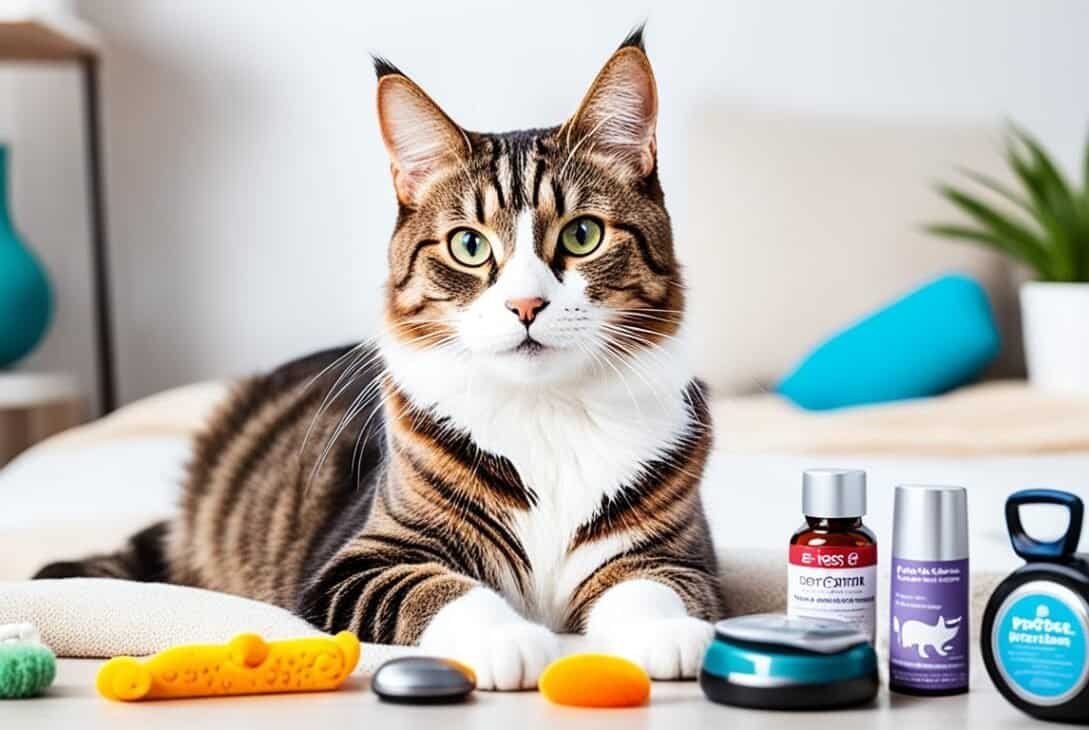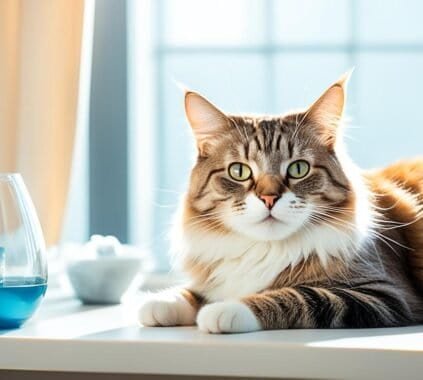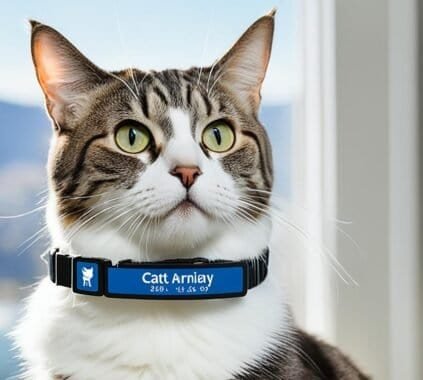Welcome to our guide on cat health insurance! As a responsible pet owner, it’s essential to prioritize the well-being of your feline companion. Cat health insurance provides financial protection and peace of mind when unexpected medical expenses arise. In this article, we will explore the best cat insurance plans available in the US and help you make an informed decision for your beloved furry friend.
Key Takeaways:
- Choosing the right cat health insurance plan is crucial for your feline companion’s well-being.
- There are various cat insurance options available, so it’s important to compare and evaluate them carefully.
- Consider factors such as coverage options, deductibles, premiums, and maximum payout limits when selecting a plan.
- Top cat health insurance providers in the US offer reputable coverage and competitive pricing.
- Be aware of exclusions in cat health insurance policies to manage your expectations.
Understanding Cat Health Insurance
When it comes to taking care of our beloved feline friends, their health and wellbeing are of utmost importance. That’s why cat health insurance is becoming increasingly popular among pet owners. But what exactly is cat health insurance and how does it work?
Cat health insurance is a type of coverage that helps offset the costs of veterinary care for your cat. Just like human health insurance, cat insurance provides financial protection in case of unexpected medical expenses. With the rising costs of veterinary care, having a cat insurance plan can provide peace of mind and ensure that your furry friend receives the necessary medical treatments without breaking the bank.
The coverage provided by cat health insurance plans can vary, but they typically include services such as accident and illness coverage, as well as preventive care benefits. Accidents and illnesses can happen at any time, and having insurance can help alleviate the financial burden of medical treatments, surgeries, and medications. Preventive care benefits often cover routine veterinary exams, vaccinations, and dental cleanings, allowing you to proactively maintain your cat’s health.
There are several types of cat insurance plans available, ranging from basic to comprehensive coverage. Some plans offer reimbursement for a percentage of the veterinary expenses, while others cover a set amount per incident or illness. It is important to carefully review the details of each plan to determine which one best suits your needs and budget.
Before selecting a cat health insurance plan, it’s essential to consider factors such as the coverage options, deductibles, premiums, and maximum payout limits. You should also evaluate the reputation and customer reviews of insurance providers to ensure their reliability and customer satisfaction. Comparingcat insurance quotes from different providers can help you find affordable cat insurance that meets your cat’s specific needs.
By understanding how cat health insurance works and the different types of plans available, you can make an informed decision and provide the best possible care for your feline companion. Don’t let financial concerns prevent you from giving your cat the medical attention they need – consider investing in cat health insurance today.
Choosing the Right Cat Health Insurance Plan
When it comes to your feline friend’s health, choosing the right cat insurance plan is crucial. It ensures that your beloved pet receives the best care without placing a financial burden on you. With so many options available, navigating through the various cat insurance plans can be overwhelming. But worry not, we’re here to guide you through the process!
When evaluating cat health insurance plans, consider the following factors:
1. Coverage Options
Look for cat insurance plans that offer comprehensive coverage, including accidents, illnesses, preventive care, and hereditary conditions. A plan that covers a wide range of medical expenses will protect your cat’s health in different situations.
2. Deductibles
Take note of the deductibles offered by different insurance providers. A deductible is the amount you’ll need to pay out of pocket before the insurance coverage kicks in. Finding a plan with a deductible that fits your budget is important.
3. Premiums
Compare the premiums charged by different insurance companies. Premiums are the monthly or annual payments you make to maintain the insurance coverage. It’s important to find a plan that offers a balance between affordability and coverage.
4. Maximum Payout Limits
Consider the maximum payout limits specified in each insurance plan. This determines the maximum amount the insurance company will reimburse you for covered expenses. Look for a plan with a higher payout limit to ensure adequate financial protection.
Now that you know what to consider, it’s time to compare cat insurance quotes. Obtaining quotes from different providers allows you to assess the offered coverage, deductibles, premiums, and payout limits. This comparative analysis will help you make an informed decision.
Remember, choosing the right cat health insurance plan is an investment in your cat’s well-being and your peace of mind. By considering these factors and comparing quotes, you can find the perfect insurance plan that suits your budget and provides the best coverage for your feline companion.
Top Cat Health Insurance Providers in the US
When it comes to ensuring the well-being of your beloved feline companion, having reliable cat health insurance is crucial. To help you make an informed decision, we have compiled a list of some of the top cat health insurance providers in the US.
1. Healthy Paws

Healthy Paws is known for its comprehensive coverage options and excellent customer service. With its flexible plans, including options for accidents, illnesses, and emergency care, Healthy Paws provides peace of mind to cat owners.
2. Petplan
Petplan offers customizable cat insurance plans that cover a wide range of veterinary services, including diagnostics, medications, and surgeries. Their comprehensive coverage also includes hereditary and chronic conditions.
3. Nationwide
With Nationwide’s Whole Pet with Wellness plan, cat owners can enjoy coverage for preventive care, accidents, illnesses, and hereditary conditions. Nationwide also offers an extensive network of veterinarians, making it convenient to find quality care for your furry friend.
4. ASPCA Pet Health Insurance
ASPCA Pet Health Insurance is a popular choice for cat owners due to its comprehensive coverage and affordable plans. They offer coverage for accidents, illnesses, and preventive care, along with optional add-ons for wellness visits and dental care.
5. Embrace Pet Insurance
Embrace Pet Insurance offers cat insurance plans that cover a wide range of conditions, including accidents, illnesses, and alternative therapies. They also provide flexible reimbursement options and a personalized customer experience.
Remember, it’s essential to research and compare cat health insurance providers to find the one that best suits your cat’s needs and your budget. By investing in cat insurance, you can ensure that your furry friend receives the medical care they deserve.
Key Factors to Consider in Cat Health Insurance Coverage
When evaluating cat health insurance coverage, it’s important to consider several key factors that will determine the extent of protection and care your feline companion will receive. By understanding these factors, you can make an informed decision and choose a cat insurance plan that suits your pet’s specific needs.
1. Preventive Care
Preventive care includes vaccinations, annual check-ups, and routine screenings that help keep your cat healthy. Some insurance plans may cover these preventive services, while others may require add-ons or separate coverage. Consider the importance of preventive care for your cat’s overall well-being and evaluate whether the insurance plan you’re considering provides adequate coverage in this area.
2. Accidents and Injuries
Cats are naturally curious and may occasionally get themselves into accidents or experience injuries. It’s crucial to have insurance coverage that includes treatment for accidents, emergency care, and even surgical procedures if necessary. Look for insurance plans that specifically mention coverage for accidents and injuries, ensuring your furry friend is protected in unexpected situations.
3. Illnesses
Cats can develop various illnesses throughout their lives, ranging from common illnesses to more severe conditions. Consider the range of illnesses covered by the insurance plan and whether it includes coverage for diagnostic tests, medication, surgeries, and hospital stays. Adequate coverage for illnesses will provide you with peace of mind, knowing that your cat’s medical needs will be taken care of.
4. Hereditary Conditions
Some breeds of cats are more prone to hereditary conditions and genetic diseases. If you have a purebred cat, it’s essential to choose an insurance plan that covers hereditary conditions. This coverage will ensure that your cat receives the necessary care and treatment, should they develop any inherited health issues.
5. Chronic Diseases
Chronic diseases, such as diabetes or kidney disease, require ongoing care, medication, and regular vet visits. When evaluating cat health insurance coverage, consider whether the plan provides coverage for chronic diseases. Having insurance that covers these long-term conditions will alleviate the financial burden and enable you to provide the best possible care for your cat.

By carefully considering these key factors in cat health insurance coverage, you can ensure that your beloved feline companion receives the necessary medical care and treatment when needed. Take the time to compare different cat insurance options and choose a plan that offers comprehensive coverage, giving you peace of mind and protecting your cat’s well-being.
Common Exclusions in Cat Health Insurance
When considering cat health insurance, it is essential for cat owners to understand the common exclusions in insurance policies. While cat insurance provides coverage for a wide range of medical expenses, there are certain conditions, treatments, and procedures that are often not covered.
One common exclusion in cat health insurance is pre-existing conditions. Insurance providers typically do not cover any medical conditions that existed prior to the policy’s effective date. This means that if your cat has a pre-existing condition such as diabetes or a heart condition, expenses related to those conditions may not be covered.
Another exclusion to be aware of is elective procedures. Procedures that are considered elective, such as cosmetic surgeries or certain preventive treatments that are not deemed medically necessary, may not be covered under the insurance plan.
Additionally, some insurance policies may exclude coverage for hereditary conditions. Certain breeds of cats are prone to specific hereditary conditions and if your cat belongs to one of these breeds, it’s important to check if the insurance plan covers such conditions.
Alternative therapies and experimental treatments are often excluded from cat health insurance. These can include treatments like acupuncture, chiropractic care, or clinical trials for new medications or procedures.
It’s also important to note that routine or preventive care, such as vaccinations, annual check-ups, and spaying/neutering, may not be covered by all insurance plans. While some plans offer optional add-ons for preventive care coverage, others may exclude it completely.
Understanding these common exclusions in cat health insurance policies is crucial for cat owners. By being aware of what is not covered, you can better manage your expectations and plan accordingly. It’s important to carefully review the terms and conditions of each insurance policy and choose one that aligns with your cat’s specific needs and your budget.
Tips for Making Cat Health Insurance Claims
When your cat requires medical attention, having a reliable cat health insurance plan can provide much-needed financial assistance. However, navigating the claims process can sometimes be confusing. To help you make the most of your cat insurance coverage, we have compiled a list of tips and guidance.
Gather the Necessary Documentation
- Keep a copy of your cat’s medical records, including vaccinations, treatments, and any pre-existing conditions.
- Retain copies of receipts, invoices, and itemized bills from your veterinarian.
- Ensure you have your insurance policy details and contact information readily available.
Understand the Claim Submission Process
- Familiarize yourself with your cat health insurance provider’s claim submission process. Some may require you to submit claims online, while others may accept them via mail or email.
- Follow the specific instructions provided by your insurance provider, including any required forms or supporting documentation.
- Submit your claim promptly to avoid any potential delays.
Be Aware of Timelines
- Take note of the deadlines for submitting claims. Missing these deadlines may result in claim denial or a reduction in reimbursement.
- Be aware of waiting periods or specific timeframes for coverage to take effect.
Contact your Insurance Provider for Assistance
If you have any questions or need assistance, don’t hesitate to reach out to your cat health insurance provider. They can provide guidance on the claims process, clarify coverage details, and address any concerns you may have.
By following these tips and being proactive throughout the claims process, you can navigate cat health insurance with ease and maximize the benefits of your policy. Ensuring you have the necessary documentation, understanding the claim submission process, and being aware of timelines are key to successfully obtaining reimbursement for your cat’s medical expenses.
Conclusion
After exploring the various aspects of cat health insurance, it is clear that having a comprehensive insurance plan is essential for the well-being of your feline friend. Cat health insurance offers financial protection and peace of mind, ensuring that you can provide the best possible care for your cat without worrying about the cost.
By investing in cat health insurance, you gain access to a wide range of benefits, including coverage for preventive care, accidents, illnesses, and chronic conditions. This enables you to proactively manage your cat’s health and detect potential issues early, leading to better outcomes and a longer, happier life for your beloved companion.
To make an informed decision about cat health insurance, we encourage you to explore different insurance options and compare quotes. Look for providers that offer comprehensive coverage, competitive premiums, and excellent customer service. By taking the time to research and compare, you can find the best cat health insurance plan that aligns with your cat’s needs and your budget.
Remember, choosing cat health insurance is an investment in your cat’s health and well-being. By prioritizing their medical care and securing financial protection, you can provide them with the best possible chance at a long and healthy life. Don’t delay – start exploring cat health insurance options today and give your furry friend the coverage they deserve!
FAQ
What is cat health insurance?
Why do I need cat health insurance?
What does cat health insurance cover?
How do I choose the right cat health insurance plan?
Are there any exclusions in cat health insurance?
How do I make a claim with cat health insurance?
Can I use any veterinarian with cat health insurance?
How much does cat health insurance cost?
Can I get cat health insurance for an older cat?
What should I consider when comparing cat insurance quotes?
Last modified: March 13, 2024














[…] not all plants are safe for your furry friend. Some plants contain toxins that can cause severe health issues if ingested by cats, ranging from mild gastrointestinal upsets to more serious […]
[…] plan: Create an evacuation plan specific to your home and identify escape routes. Practice the plan with your cat, so they become familiar with the […]